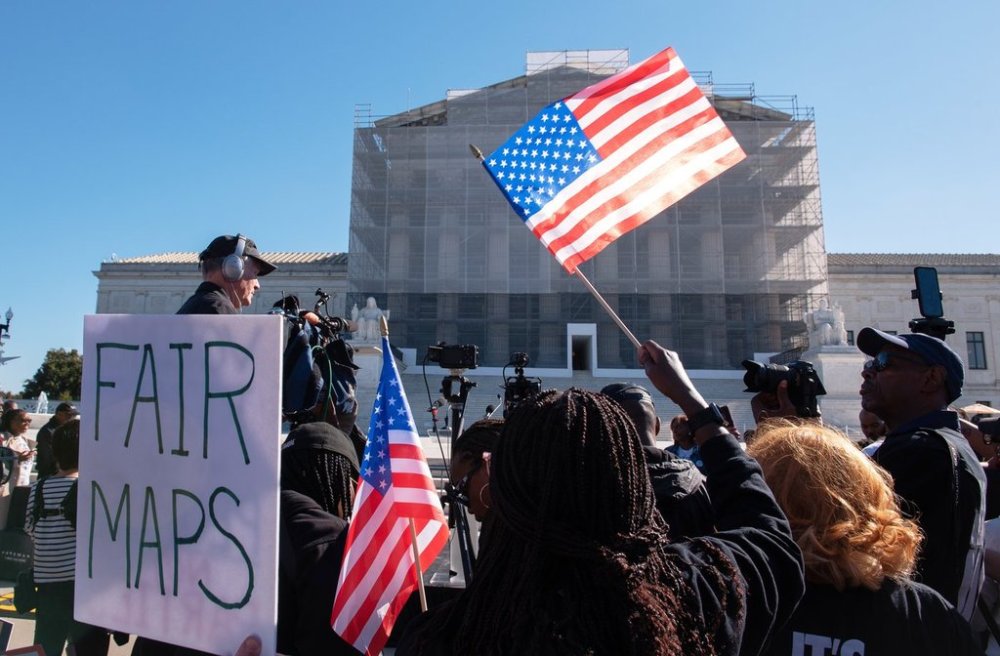World
Supreme Court Review Sparks Fears Over Minority Voting Rights

The Supreme Court’s recent oral arguments in the case of Louisiana v. Callais have raised significant concerns about the potential erosion of minority representation in American politics. Key provisions of the Voting Rights Act of 1965, particularly Section 2, which prohibits discrimination in voting practices, are under scrutiny. Lawmakers, civic leaders, and advocates fear that a ruling against this provision could reverse decades of progress in political representation for racial minorities.
During the courtroom proceedings, justices expressed skepticism regarding the constitutionality of Section 2. This part of the Voting Rights Act has been credited with enabling greater political participation by historically marginalized communities. Rep. Cleo Fields, who represents the Louisiana district central to the case, highlighted the broader implications of the court’s decision. “If they do away with Section 2, they know the ripple effect that’s going to have all over this nation,” Fields stated in an interview with The Associated Press. He emphasized the law’s critical role in safeguarding the voices of minority populations.
Since the enactment of the Voting Rights Act, there has been a marked increase in the political representation of communities of color. This legislative milestone has empowered Black, Asian, and Latino lawmakers, particularly in the Deep South, where once-monolithic white supremacy dominated state legislatures. The act was later amended to extend protections to “language minorities,” reinforcing its commitment to inclusive democracy.
In the current climate, some lawmakers fear that reversing these protections could lead to a regression in political representation. Rep. Yvette Clarke, chair of the Congressional Black Caucus, expressed anxiety about ongoing redistricting efforts, particularly in states like Texas, which she described as “blatant targeting” of Black lawmakers. Clarke emphasized that the potential ruling could have “an impact for generations to come.”
The backdrop of the Supreme Court’s deliberations includes significant events from the past, such as the brutal struggles for civil rights in places like Selma. Rep. Terri Sewell, representing a majority-Black district in Alabama, remarked on the historical significance of the arguments, stating that “old battles have become new again.” Sewell underscored the importance of maintaining a representative democracy, noting the ongoing struggle for civil rights.
Voting rights advocates argue that discriminatory actions have increased since the Supreme Court’s 2013 decision in Shelby v. Holder, which weakened certain provisions of the Voting Rights Act. Should Section 2 be similarly curtailed, there are fears that Black political representation could regress decades.
During the oral arguments, the conservative justices questioned the necessity of race-conscious remedies for proven discrimination. Justice Brett Kavanaugh inquired about the timeline for such applications, while Justice Ketanji Brown Jackson countered that Section 2 merely serves as a tool for determining when remedies are required. Jackson argued that it should not be time-limited, as it is essential for addressing ongoing discrimination.
The outcome of this case could fundamentally alter the landscape of American politics. Lawmakers like Rep. Troy Carter warned that a sweeping decision against the Voting Rights Act could weaken democracy itself. “A representative form of government means it should look like its people,” Carter stated, stressing the importance of inclusivity in governance.
As the nation awaits the court’s decision, the stakes are high for minority communities and their representation in government. The Voting Rights Act of 1965 stands as a testament to the struggle for equality, and its future hangs in the balance. The ruling is expected to be delivered in the coming months, and its implications will resonate throughout the country.
In this pivotal moment, advocates for voting rights remain vigilant, prepared to continue the fight for a representative democracy that reflects the diverse makeup of the American populace.
-

 Politics4 weeks ago
Politics4 weeks agoSecwepemc First Nation Seeks Aboriginal Title Over Kamloops Area
-

 World5 months ago
World5 months agoScientists Unearth Ancient Antarctic Ice to Unlock Climate Secrets
-

 Entertainment5 months ago
Entertainment5 months agoTrump and McCormick to Announce $70 Billion Energy Investments
-

 Science5 months ago
Science5 months agoFour Astronauts Return to Earth After International Space Station Mission
-

 Lifestyle5 months ago
Lifestyle5 months agoTransLink Launches Food Truck Program to Boost Revenue in Vancouver
-

 Technology3 months ago
Technology3 months agoApple Notes Enhances Functionality with Markdown Support in macOS 26
-

 Lifestyle3 months ago
Lifestyle3 months agoManitoba’s Burger Champion Shines Again Amid Dining Innovations
-

 Top Stories2 months ago
Top Stories2 months agoUrgent Update: Fatal Crash on Highway 99 Claims Life of Pitt Meadows Man
-

 Politics4 months ago
Politics4 months agoUkrainian Tennis Star Elina Svitolina Faces Death Threats Online
-

 Sports5 months ago
Sports5 months agoSearch Underway for Missing Hunter Amid Hokkaido Bear Emergency
-

 Politics5 months ago
Politics5 months agoCarney Engages First Nations Leaders at Development Law Summit
-

 Technology5 months ago
Technology5 months agoFrosthaven Launches Early Access on July 31, 2025




















